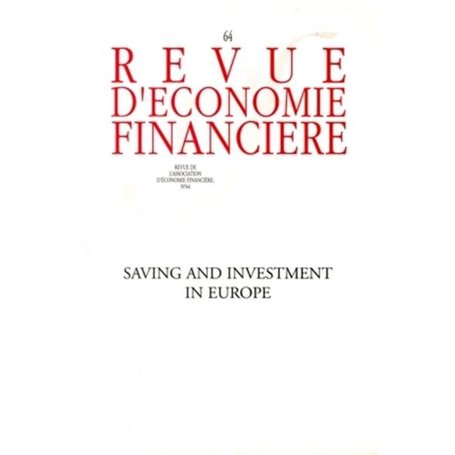Saving and investment in Europe
Format BrochéAuteur : Collectif

Livraison en Guadeloupe tout compris

Retours et SAV simplifiés

Garantie Isleden
Description
Now that the euro has become tangible, doubtless the European financial market will take more definite shape in the minds of investors and more particularly of savers of the twelve countries which comprise the euro area. Since 1 January 1999, the euro has already been a reality for companies and financial institutions. The 1 January 2002 date, however, is exceedingly important because it marks not only a change in the means of payment used, but also from the client point of view, of the general transition to the euro for products of asset and liability.
When a system of accounts comprehensively covering the euro zone as a whole was being introduced, it was necessary to pinpoint our knowledge and ignorance, the latter unfortunately still being substantial (A. Babeau). With the data which we possess, F. Pansard try to analyse the "the euro zone's major economic balances". Although some data is still missing, the accounting frame exists. The "wealth accumulation model" embraces all the scales which we are accustomed to in national accounts and also those with which we are less familiar since they have only recently emerged (A. Babeau). Taking only households in the euro area, one may wonder whether their "financial resources" and the uses they make of them have undergone notable changes in recent years. The frame for the "financing table" used by A. Mpacko Priso and L. Grillet-Aubert is a well-suited instrument for observing the "resources" side, the change in the respective weights of savings and credit, and the change in the position of physical investment and financial investment.
Without data on non-financial capital, at least the amount and composition of Europeans' financial capital can be studied (A. Babeau and A. Mpacko Priso). More generally, it is interesting to identify the "final instrument" for their financial investment (V. Oheix and B. Séjourné). Specific institutional or regulatory characteristics, on the other hand, play an important role in households' asset allocation. It is therefore necessary to investigate the differences in Europe between the various tax provisions which apply to capital income (T. Laurent and Y. L'Horty). It is a difficult investigation to make, since the provisions contained in tax codes are one thing and their application is often another (P. Bollon). Upstream from regulations and the way institutions work, there is a cultural element in the savings or investment act. The "psychological portrait" drawn by W. De Bondt, P. Zurstrassen and A. Arzeni is based on the results of a thorough survey which called in question a number of received ideas. One of the main concerns of European savers in recent years has been the lowering of the "replacement rates" for pension schemes caused by the population's ageing. A. Boubel and B. Séjourné analysed the various factors explaining the expansion of life insurance in Europe. In the continuation of this contribution, J. Cornu ponders on the degree of life insurance maturity in the various European markets and its future prospects.
The other major field in which changes have been recorded over the last ten years in the behaviour of individuals' investments is evidently the direct or indirect holding of shares. It is therefore all the more necessary to follow L. Guiso's, M. Haliassos' and T. Jappelli's description of European shareholders' profile. A. Leclair and C. Pardo present a complete appraisal of the development of the various types of fund in Europe during the decade, thought D. Davydoff describes the expansion of these funds. For a better perception of the relative weight of non-listed companies, M. Dietsch and L. Weill take as a starting point their own funds, which will be reconciled with those of listed companies. M. Bardos, M. Chazelas and R. Isnard take the same problem and repositions it, not only in a historic and theoretical perspective, but also in its operational environment.
Caractéristiques
Caractéristiques
- Format
- Broché
- Auteur(s)
- Collectif
- Collection
- Revue d'économie financière
- Date de parution
- 25/01/2010
Livraison en Guadeloupe
Notre priorité est votre satisfaction et nous mettons tout en œuvre pour vous apporter un service irréprochable.
Isleden livre chez vous en Guadeloupe !

Grâce à sa logistique ultra-performante, grâce à ses partenaires locaux, Isleden apporte votre commande directement chez vous ou dans votre boîte aux lettres si vous n'êtes pas là.
Si le colis est trop volumineux ou si sa valeur est importante, le colis sera remis au Bureau de poste le plus proche ou vous pourrez aller le chercher au moment qui vous arrange, en toute sécurité.
Commandez depuis votre canapé et faites vous livrer à domicile. C'est aussi simple que ça !
Livraison en moins de 15 jours sur plus d'1 million d'articles disponibles !

Chaque jour, Isleden ajoute à son catalogue de nouveaux fournisseurs et des milliers de produits. Revenez régulièrement pour trouver la perle rare.
Dès la commande passée, nous mettons tout en œuvre afin de réduire le temps de livraison. Nos transporteurs et partenaires locaux font le maximum pour vous apporter rapidement votre commande, dans les meilleures conditions.
Que vous commandiez un téléphone mobile, une perceuse ou un ordinateur portable, nous attachons une grande importance à ce que vous profitiez rapidement de votre achat.
Un service Exclusif pour les guadeloupéens !

Fini la galère des achats sur les sites qui ne livrent pas directement, rapatriés comme on peut, sans retour possible ni SAV, et parfois avec une ardoise à l'arrivée qu'on avait pas prévu.
Chez Isleden il n'y a pas de taxes ni de frais de douane. Nos prix sont tout compris et vous n'avez rien à payer à l'arrivée. Vous avez la possibilité de nous retourner votre produit sous 14 jours et le SAV est bien sûr pris en charge.
Tous nos produits sont garantis et bénéficient du service premium Isleden. en cas de panne, le formulaire disponible sur le site permet faciemnt d'enregistrer son SAV qui sera alors traité dans les meilleurs délais.



